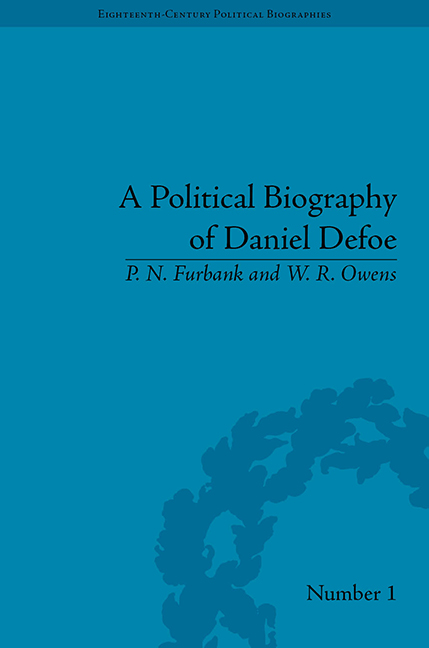Book contents
- Frontmatter
- CONTENTS
- The Authors
- Acknowledgements
- Abbreviations
- Introduction
- 1 Poetry, Pamphleteering and the Pillory
- 2 Defoe and the Dead King
- 3 The Author of the Review
- 4 Propagandist for the Union
- 5 ‘Maintaining a Counter Correspondence’
- 6 1710: The Fateful Step
- 7 Defoe and the Whig Split
- 8 The Return of the Prodigal
- Appendices A Three Recently-Discovered Letters from Defoe to Godolphin (1708)
- Appendices B The ‘Sir Andrew Politick’ Letter (25 October 1718)
- Appendices C Defoe's An Appeal to Honour and Justice (1715)
- Notes
- Index
4 - Propagandist for the Union
- Frontmatter
- CONTENTS
- The Authors
- Acknowledgements
- Abbreviations
- Introduction
- 1 Poetry, Pamphleteering and the Pillory
- 2 Defoe and the Dead King
- 3 The Author of the Review
- 4 Propagandist for the Union
- 5 ‘Maintaining a Counter Correspondence’
- 6 1710: The Fateful Step
- 7 Defoe and the Whig Split
- 8 The Return of the Prodigal
- Appendices A Three Recently-Discovered Letters from Defoe to Godolphin (1708)
- Appendices B The ‘Sir Andrew Politick’ Letter (25 October 1718)
- Appendices C Defoe's An Appeal to Honour and Justice (1715)
- Notes
- Index
Summary
To hear our People speak of Scotland, or of the Scots Affairs or People, it would make a Stranger think that this same Place call'd Scotland was some remote Country in the East-Indies, or about Madagascar, or some Island in the Fretum Magellanicum, the North-West Passages, the South Seas, or somewhere very unfrequented, where very few People ever came, and from whence, like our News from Muscovy, Things were very uncertainly related, and our Accounts from thence very little to be depended upon.
The learned Gentlemen of this Party, tho' skill'd in History, Masters of Geography, and have seen great Part of the World in their Travels, they'll tell you that Scotland is a barren, uncultivated, desolate Country; that the Land is all barren and will hardly maintain the People that live there – Nay, they will very learnedly ask sometimes, if there is any Mutton, or any Beef, or any Butter, or any such thing as Milk in Scotland – The Highlanders they take to be a Sort of Monsters, and ask, if they live upon Roots and the Bark of the Trees.
This evocation of England's benighted ignorance regarding Scotland, in which Defoe anticipates Macaulay, was to be one element in his approach to the country. Another – though till 1706 he most probably had never crossed the Border – was a pretension to speak about Scotland as an authority.
- Type
- Chapter
- Information
- A Political Biography of Daniel Defoe , pp. 61 - 73Publisher: Pickering & ChattoFirst published in: 2014

